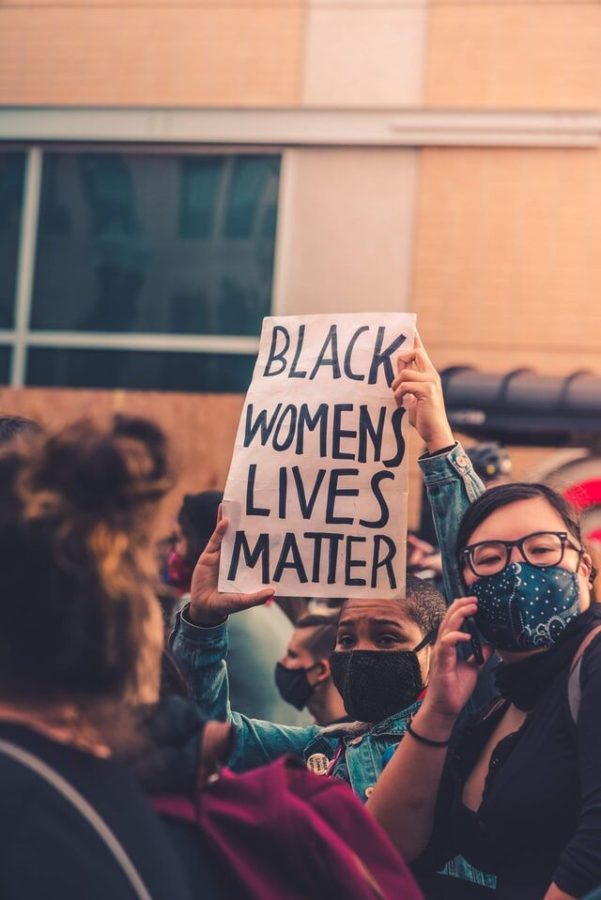Black women urge community to take action against racial injustice
Following the deaths of Breonna Taylor, George Floyd and many others, protests for the Black Lives Matter movement have happened all over the world, specifically protests fighting for Black womxn.
September 24, 2020
Iowa State Black women explained how individuals need to educate and act on racial injustices at Iowa State and in communities.
Jazzmine Brooks, equity and inclusion coordinator in the Equal Opportunity Office, said racial injustice can be defined as people of color not receiving the same opportunities as white people.
This year has made history in many ways, including the resurgence of the Black Lives Matter movement. Through the internet and social media, the murders of George Floyd, Breonna Taylor and Ahmaud Arbery, have been put on display for the world. While these graphic videos and stories have sparked nationwide protests and a global call for change, Black women on campus said there is still much more work to be done in representing and advocating for Black lives.
Danielle Douglas, sophomore in animal science, said Iowa State is not working hard enough to defend and support Black lives.
“They’ll send out emails on Black Lives Matter, but there’s no action,” Douglas said.
Adaeze Ajiri, freshman in psychology, offered a different perspective.
“[Racial harassment and injustice] only get taken seriously when it involves the school’s image,” Ajiri said.
With the recent escalation of the Black Lives Matter movement, Ajiri, Brooks and Douglas said it is now more important than ever to stay informed and educated on the realities of being a Black individual in the United States, whether a student or a staff member; while the entire country might seem very big, there are cases of racial injustice happening right in our own backyard.
Douglas said racism is the same everywhere.
“You can’t escape it,” she said.
With evidence of racism being found historically and currently in nearly every aspect of life, Ajiri, Brooks and Douglas agreed the best ways to react and combat these issues is to start making the important changes in regards to representation, education and action.
Ajiri and Douglas both believe Black women are being underrepresented in the Iowa State community.
“There are no Black female professors,” Douglas said. “There’s only one Black female that I know, that has some office of power […] compared to the hundreds that are here.”
Ajiri and Douglas both questioned why white professors teach classes such as African American studies.
“Why is there a white woman teaching me about my people’s history?” Douglas asked.
Brooks explained that the issue of underrepresentation can also be seen among the diversity of Iowa State students. There are many classrooms on campus that are often filled with white students, but rarely any Black students. This issue causes the students to reflect back on their classroom experiences and ask themselves if there was any Black representation. This also calls for the Iowa State faculty and staff to take a closer look at who they are hiring and why.
Brooks said one of the easiest, most effective ways to eradicate racial injustice is by educating yourself. Reading, learning and becoming self-aware are great first steps. Whether that is reading about African history or reflecting on your own thoughts and actions that may have stemmed from racial differences, it is extremely important to diversify yourself.
“If you don’t know [the history of African Americans and their treatment], then it’s hard to understand,” Douglas said.
Ajiri also explained that those who don’t hold a Black or African American identity should learn from the right people, and to not just search online. She stressed that there is much more to African history than just the slave trade.
“Don’t start with slavery, start with Africa,” Ajiri said. “Let’s learn the good and the bad…. Find [out] about the good, the joyful things.”
These women said the most important step in combating racial injustice is taking action.
“See something, say something […] If you know it’s wrong, you should be saying something about it,” Douglas said.
Ajiri presses people to consider what they would do if this was happening to their loved ones. She encouraged people think about how they would react if this same systemic racism affected other races, families and communities.
Brooks wonders if others are going to call themselves an ally and be aware, or if they are going to be an advocate and bring something to the table.
“Allyship isn’t enough anymore,” Brooks said. “We need folks to take action, to do work.”
Ajiri, Brooks and Douglas said if people see an example of racial injustice, whether on campus or in people’s hometowns, individuals should speak up. They explained that it is no longer enough for someone to simply say they support the Black Lives Matter movement — people need to take action.
“Talk. Start a conversation,” Douglas said. “Nothing will get better if no one talks about it.”

















